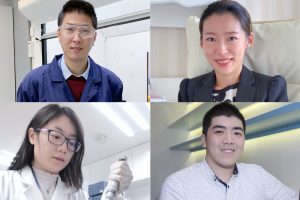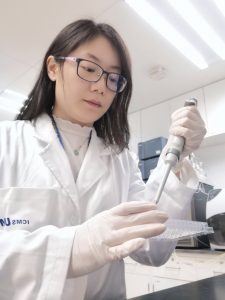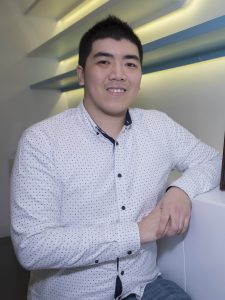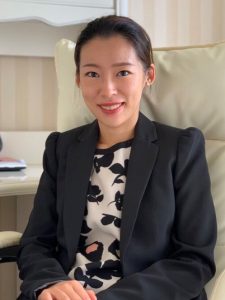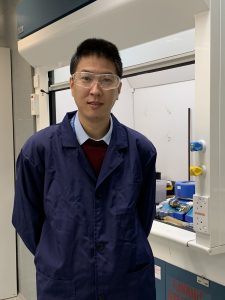The University of Macau (UM) launched a three-year UM Macao Fellow Programme in 2015, in order to nurture local young scholars and to encourage high-calibre professionals from Macao to seek career development in the city. So far, 20 outstanding young scholars who graduated from renowned universities at home and abroad have become UM Macao Fellows through this programme. Seven of them with outstanding performance have become assistant professors at UM. Not only can these UM Macao Fellows conduct research at UM; they can also serve as visiting scholars at reputable universities outside of Macao to enhance their teaching and research experience so they can give back to Macao with their expertise.
Searching for Cures for Diseases
Cheang Wai San graduated from the Chinese University of Hong Kong with a PhD degree in biomedical sciences. Ever since joining UM through the UM Macao Fellow Programme in 2015, Dr Cheang has been actively engaged in scientific research. Under the guidance of experienced faculty members at UM, she has already published more than 30 research articles in various international journals over the past few years. In January 2019, she was promoted to the rank of assistant professor in the Institute of Chinese Medical Sciences. ‘The UM Macao Fellow Programme gave me a precious opportunity to enhance my research capability,’ she says.
In 2016, Cheang was assigned to the University of California, San Diego, for a two-year research stint. ‘That experience was extremely valuable,’ says Cheang. ‘It not only helped me develop an international perspective, but also gave me an opportunity to learn from world-class researchers. I learned how to effectively conduct a research project and how to promote exchange between our two universities by working with different professors. These all greatly enhanced my teaching and research experience.’
Currently, Cheang mainly studies novel biomarkers with therapeutic potential for vascular and metabolic disorders as well as the efficacy and action mechanism of the active ingredients of Chinese medicine and natural products for vascular dysfunction associated with obesity and diabetes. Research is hard, but Cheang derives enormous joy and a deep sense of satisfaction from it. ‘Every colleague in the lab is knowledgeable, so working with them enriches my knowledge,’ she says. ‘We are here with a shared sense of mission, which is to find cures for diseases to improve people’s health.’
Improving NMR Testing Technology with Harvard
Lei Ka-Meng is an assistant professor in the Institute of Microelectronics at UM. He obtained his bachelor’s and PhD degrees from UM. Because of his outstanding research capability, he was selected to participate in research projects of UM’s State Key Laboratory of Analog and Mixed-Signal VLSI when he was still a third-year undergraduate student. Upon graduation in 2012, he was admitted to the university directly for PhD studies. From 2017 to 2019, he served as a post-doctoral visiting scholar at Harvard University , where he conducted interdisciplinary research with Harvard researchers and developed a portable nuclear magnetic resonance (NMR) platform that can significantly reduce the cost and time of NMR tests (such as DNA and protein tests).
Dr Lei carried out interdisciplinary research with faculty members of the Harvard School of Engineering and Applied Sciences and Department of Physics as well as industry experts in an effort to improve the older version of the NMR platform to enable more effective application of the platform in different fields (such as for testing the concentration of protein, molecular structure, and the ingredients of food samples). According to Lei, one member of the interdisciplinary research team is a scientific advisor at Schlumberger, the world’s leading oilfield service provider, and through working with this person, he gained a better understanding of the merits and drawbacks of the old version of the platform and successfully improved it.
According to Dr Lei, the current diagnostic tests usually require the use of large devices and a lot of time and skilled professionals, but with the proposed NMR technique, large devices are no longer needed for diagnostic tests and the cost can therefore be brought down from between MOP 500,000 and MOP 600,000 to between MOP 30,000 and MOP 40,000. Moreover, this technique allows diagnostic tests to be conducted outside large laboratories. Even clinics in remote regions can afford it. ‘I really hope this technique will be introduced to other parts of the world,’ he says.
After completing his research at Harvard, Lei returned to UM. So far, he has published nine papers in peer-reviewed journals and nine conference papers. He has also given lectures in the United States, Portugal, and Italy to share his research findings. He has also co-authored a book and a book chapter (published by Springer). He also holds a US patent.
Academic Research that Informs Policy Making
Aileen Lam obtained her bachelor’s degree and PhD degree, both in land economy, as well as her master’s degree in environmental policy, from the University of Cambridge. After completing her studies, she joined UM’s Department of Economics through the UM Macao Fellow Programme in 2016, with the aim of improving public awareness of the environmental issues created by the pursuit of economic growth in Macao. According to Lam, climate change has a real impact on financial systems and investors worldwide. ‘Reusable energy, electric cars, and low-carbon products may render fossil fuel obsolete and create financial bubbles,’ says Lam. Therefore, she returned to the University of Cambridge in 2017 as a Macao Fellow to expand her research in this area.
‘The general public may think that climate change will only pose risks to financial systems. But it will also create new opportunities for investors,’ says Lam. ‘Yet how climate change will shape asset value in the future remains largely unknown at this moment and is worth studying.’ Lam is grateful to UM for giving her the opportunity to work at the University of Cambridge as a visiting scholar, which allowed her to reunite with Cambridge researchers and continue with the study on financial risks and the impact of climate change. ‘Currently, we are evaluating the financial risks caused by the rapid transition to a low-carbon economy,’ she says.
Because of the novel coronavirus epidemic, Lam has been giving classes to her students online in this semester. When teaching the impact of climate change on human behaviour in her macroeconomics class, she stressed the importance of environmental protection. In September last year, she began working with the University of Hong Kong on a survey to find out whether extreme meteorological disasters such as Typhoon Hato could raise public awareness of the consequences of climate change, in order to understand how individuals could adapt themselves to the changes in these situations. ‘Through these research studies, I hope to bring concrete benefits to the community and contribute to policy-making,’ says Lam.
Returning Home for Teaching and Research in Chemistry
Cheong Weng Chon joined the Department of Physics and Chemistry, Faculty of Science and Technology, as a UM Macao Fellow in 2019. Before joining UM, he spent ten years at Tsinghua University in Beijing, where he obtained his bachelor’s, master’s, and PhD degrees in chemistry through a combined undergraduate-master’s-doctoral programme. Cheong has always wanted to become a chemist since childhood. He graduated from high school in 2009, but at that time, none of the higher education institutions in Macao offered a degree in chemistry. ‘I had to pursue further studies in chemistry outside Macao, and I thought I would never be able to find a job in Macao upon graduation,’ says Cheong. ‘So I was really excited when I learned that UM established the Department of Physics and Chemistry, and now I can finally work in my home town.’
Over the past ten years, Cheong has been studying chemical synthesis and catalytic performance of nanomaterials and atomically dispersed materials. He is also deeply interested in the application of electron microscope technology. At UM, he plans to spend most of his time exploring synthesis strategy for dual atomic-site catalysts and studying the similarities and differences between single atomic-site catalysts and dual atomic-site catalysts in terms of their catalytic performance and mechanism. ‘The greatest reward of working at UM is that I can evaluate the prospect of a certain research field from the perspectives of the university and the faculty in the early stages of my teaching career. This helps me adjust my research direction in the future,’ says Cheong. ‘I enjoy teaching and has taught Cantonese for ten years at Tsinghua University. At UM, I have participated in several workshops offered by the Centre for Teaching and Learning Enhancement. UM values faculty members’ teaching skills so much that it has left a deep impression on me. I’ve also had many opportunities to work with experts and scholars from other universities.’
Once the epidemic is under control, Cheong plans to serve as a visiting scholar at the University of California, Berkeley, for a period of two years. ‘This is a top public research university located in San Francisco Bay Area. I hope I will be able to better adapt myself to the development of UM and Guangdong-Hong Kong-Macao Greater Bay Area,’ he says.

